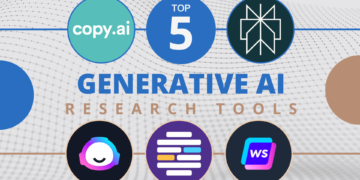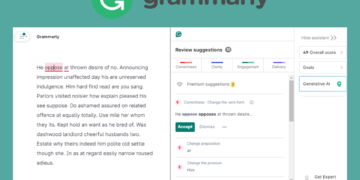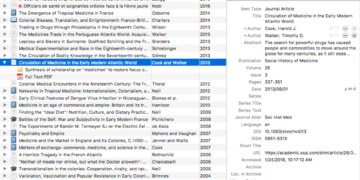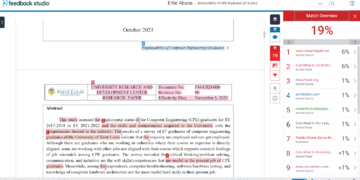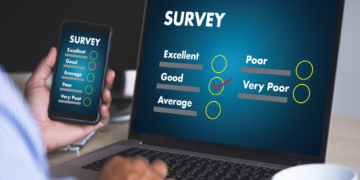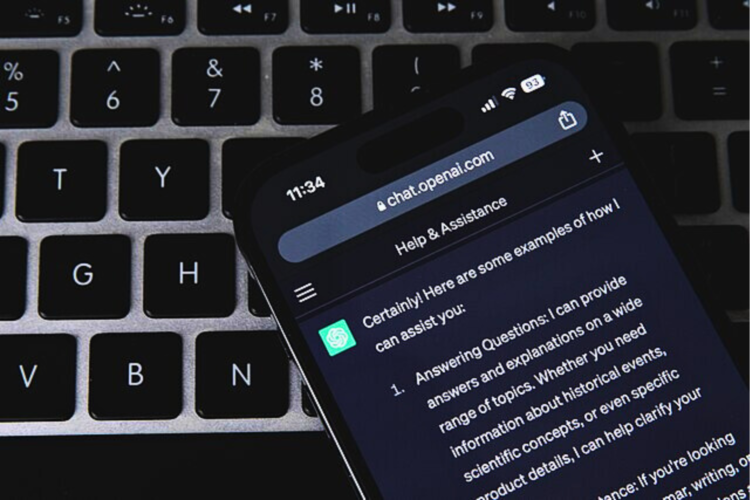Research writing using ChatGPT can streamline the drafting process, enhance clarity, and improve the overall quality of your work by providing suggestions, refining language, and helping organize your ideas effectively. ChatGPT, developed by OpenAI, is an advanced language model that has become a powerful tool for researchers across various fields. Leveraging state-of-the-art natural language processing (NLP) techniques, ChatGPT can generate human-like text, assist with data analysis, and provide insights on a wide range of topics. This comprehensive review examines the capabilities, applications, advantages, and limitations of ChatGPT as an AI tool for research, offering a detailed look into how this technology can revolutionize the research process. You can also check out the other Top 5 AI Tools for Academic Research to find additional tools specifically designed to enhance your writing, streamline editing, and improve overall text quality.
1. Text Generation
ChatGPT excels in generating coherent and contextually appropriate text, making it an invaluable tool for drafting and refining research papers, proposals, and reports. It can assist researchers in creating initial drafts, brainstorming ideas, and articulating complex concepts in a clear and concise manner. This capability not only speeds up the writing process but also helps in maintaining a consistent tone and structure throughout the document. Here’s how:
- Drafting Initial Documents:
- Example: You need to write a research proposal on the impact of climate change on marine biodiversity. Provide ChatGPT with an outline or key points, and it can generate a cohesive draft, including sections like introduction, methodology, and expected outcomes.
- How to Use: Input a brief description or bullet points of what you want to include, such as “Write an introduction discussing the importance of studying marine biodiversity in the context of climate change.”
- Developing Abstracts and Summaries:
- Example: After completing your research, you need to write an abstract. Share the key findings and ChatGPT can generate a concise and compelling summary that captures the essence of your work.
- How to Use: Provide ChatGPT with a summary of your research findings and ask it to generate an abstract, e.g., “Generate an abstract summarizing the findings on the effects of urbanization on local bird species.”
- Creating Content for Presentations:
- Example: Preparing a presentation on your research findings? ChatGPT can help draft slides or speaker notes.
- How to Use: Describe the key points for each slide, and request ChatGPT to generate bullet points or detailed text for each section, like “Create text for a slide about the methodology used in the study on soil erosion.”
2. Data Analysis Assistance
While ChatGPT itself does not perform direct data analysis, it can significantly aid in interpreting and contextualizing data. Researchers can describe their data and findings, and ChatGPT can help in generating insights, identifying patterns, and suggesting potential implications. Additionally, it can assist in formulating hypotheses based on data trends and provide recommendations for further analysis.
- Interpreting Statistical Results:
- Example: You have data from a survey on consumer behavior and need help understanding the significance of certain trends.
- How to Use: Describe the results to ChatGPT, such as “The survey shows a significant increase in preference for eco-friendly products. What could be the implications of this trend?” ChatGPT can help explain potential meanings and impacts.
- Identifying Patterns and Hypotheses:
- Example: You notice a pattern in your experimental results and want to explore possible explanations.
- How to Use: Provide ChatGPT with details about the observed pattern, e.g., “In my experiment, higher temperatures seem to increase reaction rates. What hypotheses could explain this?”
- Suggesting Further Analysis:
- Example: Based on preliminary findings, you need guidance on what additional tests might be useful.
- How to Use: Describe your current findings and ask, “Given these results, what additional analyses should I consider to explore the effect of temperature on enzyme activity?”
3. Literature Review
Conducting a comprehensive literature review is a fundamental aspect of any research project. ChatGPT can facilitate this process by summarizing relevant literature, identifying key themes, and synthesizing findings from various sources. By leveraging its ability to process and integrate large volumes of text, researchers can gain a clearer understanding of the current state of knowledge in their field and identify gaps that warrant further investigation.
- Summarizing Research Papers:
- Example: You have several key papers on renewable energy technologies and need concise summaries.
- How to Use: Input the abstracts or main points of each paper, and ask ChatGPT to summarize them, e.g., “Summarize the key findings of these three papers on solar panel efficiency.”
- Identifying Key Themes and Trends:
- Example: You’re analyzing the state of research in behavioral economics and need to identify prevalent themes.
- How to Use: Provide a list of papers or topics, and ask ChatGPT, “What are the main themes and trends in this body of research?”
- Synthesizing Findings:
- Example: You want to combine insights from multiple studies into a coherent review.
- How to Use: Share summaries or key points from each study, and request ChatGPT to synthesize them into a cohesive narrative, e.g., “Combine these findings into a synthesis on the impact of social media on consumer purchasing behavior.”
4. Question Answering
One of the most straightforward yet powerful uses of ChatGPT is its capability to answer specific research-related questions. Whether it’s clarifying terminology, providing explanations of complex theories, or offering insights into niche areas of study, ChatGPT can provide immediate responses based on its extensive training data. This capability allows researchers to quickly access information and clarify doubts, thereby enhancing the efficiency of the research process.
- Clarifying Terminology:
- Example: You come across a term like “heteroscedasticity” in a statistics paper and need a clear explanation.
- How to Use: Ask ChatGPT directly, “What is heteroscedasticity in statistical analysis?”
- Providing Explanations of Complex Theories:
- Example: You need an explanation of quantum entanglement for your physics research.
- How to Use: Input your question, “Explain quantum entanglement in simple terms.”
- Offering Insights into Niche Areas:
- Example: You are researching a specific topic, like “the role of epigenetics in aging,” and need more information.
- How to Use: Describe your topic, and ask ChatGPT, “What are the latest insights into how epigenetics influences the aging process?”
5. Language Translation and Editing
In a globalized research environment, the ability to translate and edit text in multiple languages is crucial. ChatGPT supports various languages and can assist in translating research materials to ensure that findings are accessible to a broader audience. Additionally, it can help in editing and proofreading documents to improve clarity, coherence, and overall quality. This is particularly useful for researchers aiming to publish in international journals or collaborate with colleagues across different linguistic regions.
- Translating Research Documents:
- Example: You need to translate a research paper from English to Spanish for an international conference.
- How to Use: Provide ChatGPT with the text and specify the target language, e.g., “Translate this research paper abstract into Spanish.”
- Editing and Proofreading:
- Example: You’ve written a draft of your research paper and need help with grammar and style.
- How to Use: Share the draft text with ChatGPT, asking for edits and improvements, e.g., “Proofread this draft and suggest improvements for clarity and coherence.”
- Improving Multilingual Communication:
- Example: You’re collaborating with international colleagues and need to ensure that all communications are clear.
- How to Use: Ask ChatGPT to review and edit communications in different languages, e.g., “Edit this email draft in French for clarity and formality.”
The Review
ChatGPT
ChatGPT stands out as a versatile and powerful AI tool for researchers, offering numerous capabilities that streamline the research process. Its applications range from drafting papers to generating research ideas and automating routine tasks, providing significant advantages in terms of efficiency, accessibility, and cost-effectiveness. However, researchers must remain cautious about its limitations, ensuring that AI-generated content is accurate and ethically sound. As AI technology continues to evolve, ChatGPT is poised to become an even more integral part of the research landscape, driving innovation and enhancing the quality of academic work.
PROS
- Versatility in tasks
- Natural language understanding
- Easy integration and availability
- Enhances productivity
- Continuous improvement
CONS
- Occasional inaccuracies
- Contextual misunderstandings
- Potential for biased outputs
- Lack of deep domain expertise
- Dependence on prompt quality
Review Breakdown
-
Output Quality
-
Ease of Use
-
Performance and Speed
-
Cost and Value
-
Support and Community













